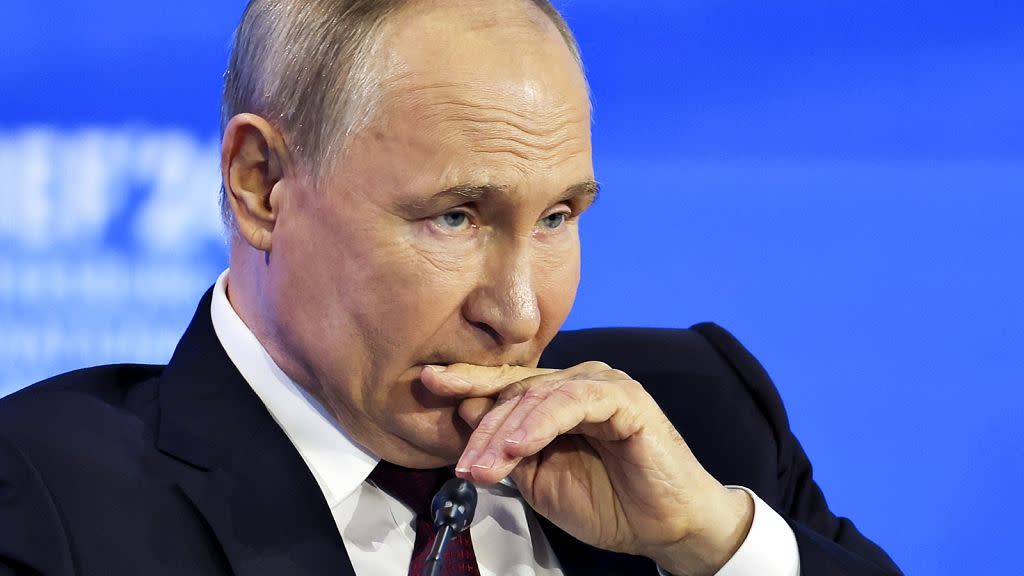EU agrees new sanctions on Russia, targeting LNG for the first time

The European Union agreed on Thursday to slap a new raft of sanctions against Russia, targeting for the first time supplies of liquefied natural gas (LNG), which several member states continue to buy despite the war in Ukraine being well into its third year.
The taboo-breaking sanctions represent the 14th package enforced since February 2022 and come at a delicate time on the battlefield, as Russian troops attempt to seize their renewed momentum to make further territorial gains.
The package is the result of protracted negotiations among ambassadors, who spent weeks haggling over highly technical details. The approval was delayed several times over the reservations voiced by several countries, including Hungary, which had previously vowed to block any sanctions in the energy sector.
However, the last hold-out was Germany over the "no Russia clause," which imposes obligations on companies to keep sensitive goods away from the Kremlin.
Brussels missed two self-imposed deadlines – the G7 in Italy and the Peace Summit in Switzerland – to give Germany more time to work things out. On Thursday morning, the country signalled its concerns had been satisfied, paving the way for the deal.
The LNG clampdown, though, falls short of an all-out import ban like the bloc previously did with coal and seaborne oil, two of Moscow's largest sources of revenues.
Instead, EU companies will still be allowed to purchase Russian LNG but be prohibited from re-exporting it to other countries, a practice known as trans-shipment.
The Centre for Research on Energy and Clean Air (CREA), an independent organisation that tracks Russian fossil fuels, estimates that in 2023 the bloc paid €8.3 billion for 20 billion cubic metres (bcm) of Russian LNG, representing 5% of the total gas consumption.
Belgium, France and Spain were the main entry points for Russian LNG.
About 22% of these supplies (4.4 bcm) were trans-shipped globally, with 1.6 bcm sent to other member states, CREA says. The rest went to China, India, Turkey and other clients.
The figures reflect the West's leading role in cargo insurance and shipping services: last year, the maritime industry of G7 countries handled 93% of Russia's LNG exports, a transport valued at €15.5 billion.
The new EU sanctions intend to curb this lucrative business and constrain Russia's ability to raise funding for its expensive all-out war on Ukraine. The penalties also target three LNG projects based in Russia that are not yet operational, which Reuters has previously identified as Arctic LNG 2, Ust Luga and Murmansk.
"Although the trans-shipment ban makes Russia's gas exports more difficult, only a complete ban on imports would really put the Russian gas business from the Arctic under pressure," said Petras Katinas, an energy analyst at CREA.
"Without the nearby EU ports, gas transportation on special icebreaker LNG tankers would hardly be economically viable."
Additionally, member states agreed on stricter measures to crack down on circumvention and close loopholes left open in the 13 previous packages of sanctions, a perennial headache in Brussels.
Some of these measures are directed at the "shadow fleet" of aging, small-sized tankers that the Kremlin employs to bypass the G7 price cap on Russian seaborne oil. Despite the $60-per-barrel limitation, Russia has spent the last few months selling its Urals oil at a price range of between $67 and $75 apiece.
Other restrictions address the use of subsidiaries from EU companies located outside the bloc that are being exploited to re-direct prohibited goods towards Moscow.
"This hard-hitting package will further deny Russia access to key technologies," said European Commission President Ursula von der Leyen. "It will strip Russia of further energy revenues. And tackle Putin's shadow fleet and shadow banking network abroad."
The 14th round also includes "remedies" to allow European firms to claim compensation for the damages inflicted by Russian retaliation, a diplomat said.
More than 100 individuals and entities have been added to the blacklist, which, since February 2022, has grown to cover over 2,200 names.
The sanctions will enter into force after their publication in the EU Official Journal, expected to happen early next week.
This article has been updated with more information.

